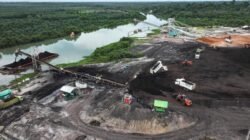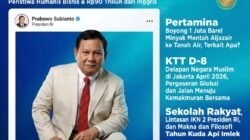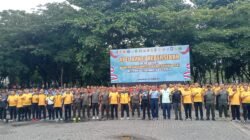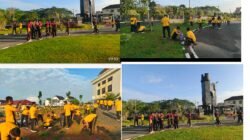

Indonesiantalk.com — Jokowi Inaugurates Lithium Battery Anode Plant in Kendal Special Economic Zone, Strengthening Indonesia’s Electric Vehicle Ecosystem
President Joko Widodo officially inaugurated a lithium battery anode material plant today in the Special Economic Zone (KEK) of Kendal Regency, Central Java.
This inauguration marks a significant step in Indonesia’s efforts to achieve energy independence and enhance its position as a key player in the global electric vehicle (EV) industry.
The factory, built by PT Indonesia BTR New Energy Material, represents a crucial milestone in bolstering Indonesia’s electric vehicle ecosystem.
President Jokowi commended the rapid development of the plant, noting, “I highly appreciate the speed of this plant’s construction. Just 10 months ago, we signed the cooperation agreement in Beijing, and now the factory is already completed.”
“This is what we call speed, and I repeatedly emphasize that countries that move quickly will outperform those that are slow. We have now become a fast-moving country,” President Jokowi said in his speech.
The inauguration event was attended by several notable figures, including Chairman of BTR Mr. He Xueqin, BTR Executive Vice Chairman & CEO Dr. Huang Youyuan, President Director of PT Indonesia BTR New Energy Material Mr. Wu Lei, and Director of PT Berkah Investama Nusantara Ismeth Wibowo.
Present were Coordinating Minister for Maritime Affairs and Investment Luhut Binsar Pandjaitan, Coordinating Minister for Economic Affairs Airlangga Hartarto, Minister of Investment/Head of BKPM Bahlil Lahadalia, Minister of Energy and Mineral Resources Arifin Tasrif, and Minister of Manpower Ida Fauziyah.
Also attending were Acting Governor of Central Java Nana Sujana, Commander of the IV/Diponegoro Military Command Major General Deddy Suryadi, Central Java Regional Police Chief Inspector General Ribut Hari Wibowo, Regent of Kendal Dico Ganinduto, and PLN Distribution Director Adi Priyanto.
Additionally, Deputy for Investment Implementation Control at the Ministry of Investment/BKPM Edy Junaedi, Secretary to the Coordinating Minister for Economic Affairs Susiwijono Moegiarso, and Special Staff to the Minister of Investment/BKPM Rizal Calvary Marimbo.
President Jokowi explained that some of the anode materials are still imported, particularly natural graphite sourced from Africa, while artificial graphite is produced at Pertamina’s refinery in Riau.
“For this anode material plant, some components are imported, specifically natural graphite from Africa. Meanwhile, artificial graphite is sourced from Pertamina’s refinery in Riau for use in the anode material,” the President detailed.
He also highlighted that while Indonesia imports lithium for battery production from Australia, the country is rich in cobalt, manganese, and nickel resources.
“For the lithium battery industry, we do not have lithium domestically. We are sourcing it from Australia, but we have abundant cobalt, manganese, and nickel in Indonesia.”
“When everything becomes integrated into semi-finished and finished products, we will become a significant player in the global supply chain,” he added.
PT Indonesia BTR New Energy Material has achieved a production capacity of 80,000 tons of anode material per year in the first phase of investment, with a total investment realization of USD 478 million.
Upon completion of phases I and II, Indonesia is projected to become the world’s second-largest producer of lithium-ion battery anode materials, with a total production capacity of 160,000 tons.
“I am very pleased that PT BTR can now produce 80,000 tons of anode material per year, which can power up to 1.5 million electric vehicles.”
“When the additional 80,000 tons production is included, it will amount to 3 million electric vehicles per year. This is a significant quantity, and we will become a major supplier of both EV batteries and electric vehicles,” President Jokowi remarked.
The inauguration of this plant is part of Indonesia’s commitment to supporting the transition to clean and sustainable energy while strengthening the national economy through the development of high-value-added industries.












